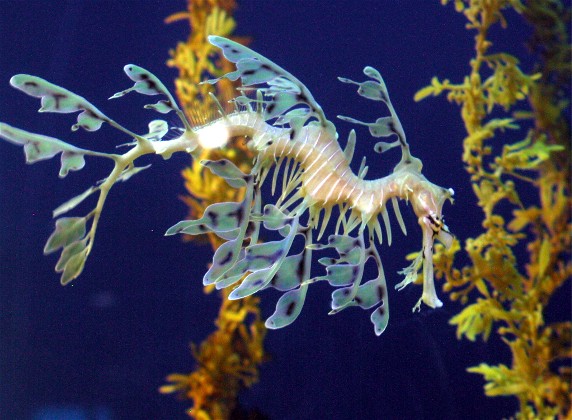|
| Query: national geographic magazine | Result: 309th of 311 | |
Leafy Sea Dragon (Phycodurus eques) - Wiki
| Subject: | Leafy Sea Dragon (Phycodurus eques) - Wiki
| |

| Resolution: 572x420
File Size: 83111 Bytes
Date: 0000:00:00 00:00:00
Camera: C4040Z (OLYMPUS OPTICAL CO.,LTD)
F number: f/2.6
Exposure: 10/80 sec
Focal Length: 210/10
Upload Date: 2007:08:31 19:02:18
|
ERROR : Server Busy(-1105)
ERROR : Server Busy(-1105)
Leafy Sea Dragon (Phycodurus eques) - Wiki
Leafy sea dragon
From Wikipedia, the free encyclopedia
[Photo] A Leafy Sea Dragon (Phycodurus eques). Date 2006. Author Wendy Rathey
The leafy sea dragon, Phycodurus eques, is a marine fish related to the seahorse. It is the only member of the genus Phycodurus. These creatures are native to the waters around southern and western Australia and generally remain in shallow, temperate waters. Their name comes from their appearance, with long leaf-like protrusions coming from all over the body. These protrusions are not used for propulsion; they serve only as camouflage. The leafy sea dragon propels itself by means of a pectoral fin on the ridge of its neck and a dorsal fin on its back closer to the tail end. These small fins are almost completely transparent and difficult to see as they undulate minutely to move the creature sedately through the water, completing the illusion of floating seaweed.
Much like the seahorse, the leafy sea dragon's name is derived from its resemblance to another creature (in this case, a mythical creature). While not large by sea monster standards, they are very large for sea horses, growing at least 18 inches (45 cm). They feed on plankton, algae, and other small flotsam, and are not preyed upon by any species other than humans. Females deposit eggs on the tail of the male where they grow to maturity. They have become endangered through pollution and industrial runoff as well as collection by fascinated divers who are entranced by their unique appearance. In response to these dangers they have been officially protected by the Australian government.
A related species is the weedy sea dragon, which is multi-coloured and grows weed-like fins and can be much smaller than the leafy sea dragon. In the November 2006 issue of National Geographic magazine, marine biologist Greg Rouse is reported as investigating the DNA variation of the two sea dragon species across their ranges.
The leafy sea dragon is the official marine emblem of the state of South Australia. A biennial “Leafy Sea Dragon Festival” is held by the District Council of Yankalilla, South Australia. It is a festival of the environment, arts and culture of the southern Fleurieu Peninsula, with a theme of celebrating the leafy sea dragon. The inaugural festival in 2005 attracted over 7000 participants and visitors.
Keeping sea dragons
It is illegal to catch and keep sea dragons, as they are a protected species. They are very fragile and unstable outside their natural habbitats.
http://en.wikipedia.org/wiki/Leafy_sea_dragon
| The text in this page is based on the copyrighted Wikipedia article shown in above URL. It is used under the GNU Free Documentation License. You may redistribute it, verbatim or modified, providing that you comply with the terms of the GFDL. |
|
Comments |
|---|
| | Guest |
|
Scientific Name: Phycodurus eques (Günther, 1865)
Common Names:
English – Leafy Seadragon, Glauert's Seadragon
Synonyms:
Phycodurus glauerti Whitley, 1939
Phyllopteryx eques Günther, 1865 |

|

|

|
national geographic magazine
309/311 |

|
 |
^o^
Animal Pictures Archive for smart phones
^o^
|
|
|

